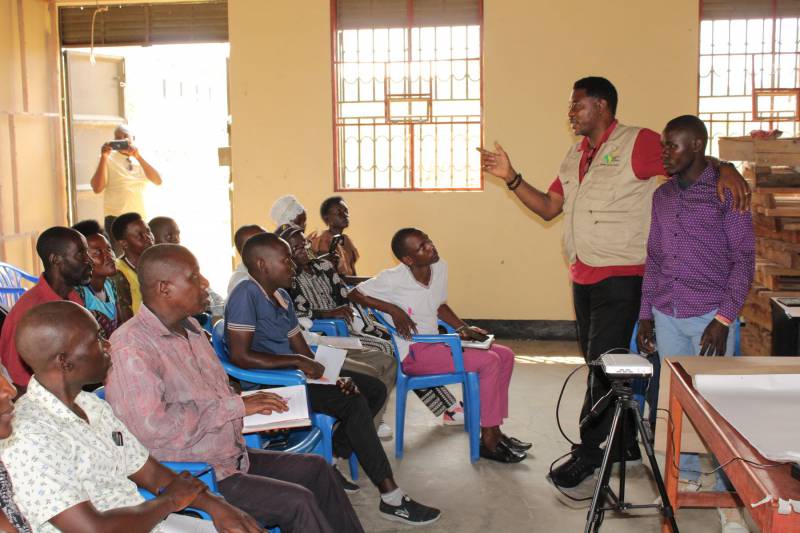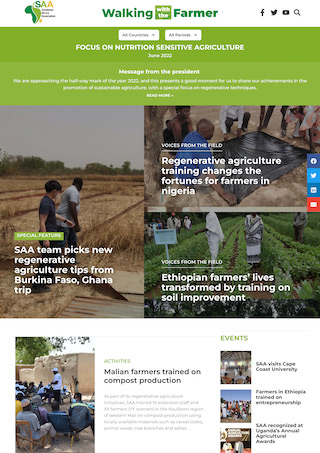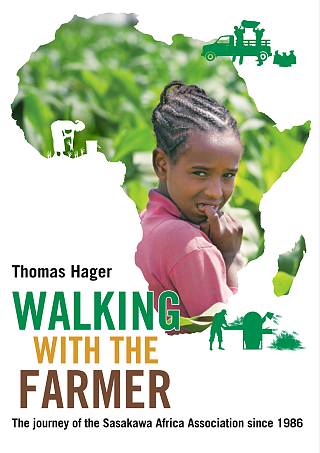SAA Shifts to Commercial Community-Based Facilitators (CCBFs) Model in Uganda

In August 2024, Sasakawa Africa Association (SAA) Uganda embarked on a strategic transition to a Commercial Community-Based Facilitators (CCBFs) model to enhance the sustainability and profitability of agricultural extension services. This shift from our traditional community-based facilitator (CBF) Model was introduced through sensitization and orientation sessions in Madudu and Kyendangala cooperatives. The CCBF model is designed to empower local facilitators with a business-oriented mindset, encouraging them to provide high-quality, demand-driven services to farmers both within and beyond their immediate communities.
The CCBF model leverages the deep community relationships and trust that CCBFs have built to ensure agricultural services are both accessible and sustainable. Unlike the traditional CBF model, which relied on stipends from NGOs , the CCBFs will now generate income by providing paid services to farmers, benefiting both, including the farmers. This shift fosters entrepreneurial thinking and addresses the unsustainable reliance on mobility allowances by empowering facilitators to offer high-quality, demand-driven services.
During the training, led by SAA's Country Director and Deputy Country Director, participants were introduced to over 14 potential income-generating services along the agricultural value. These include planting and fertilizer application services, seed and pesticide sales, and crop management advice. Emphasis was also placed on the importance of forging partnerships with tech-savvy farmers who were already using improved technologies, as these individuals were more likely to recognize and value additional services. CCBFs were also encouraged to target farmers with larger acreages, focusing on those managing substantial land to ensure the economic viability of their services.
Additionally, creating employment opportunities for rural youth and expanding services beyond initial areas was highlighted, along with diversifying offerings across multiple value chains to ensure profitability and sustainability. This comprehensive approach included everything from seed sales and planting services to more advanced offerings such as agricultural insurance and financial access, ensuring that CCBFs could cater to a broad spectrum of farmer needs and maximize their business potential.
To support the model's sustainability, emphasis was placed on making One Stop Centres (OSCAs) and Cooperatives more bankable to support CCBFs and Village Agents within the cooperative structure by enabling OSCAs to provide crucial financial support to CCBFs, such as offering loans for purchasing business tools or acquiring assets that will be hired out to CCBFs for service provision. The integration strategy not only extends the reach of services but also creates a symbiotic relationship where OSCAs generate income by facilitating essential services to farmers while CCBFs benefit from increased access to resources and a broader customer base, hence reducing production costs for farmers and improving service delivery.
 A cross- section of participants sharing a light moment with SAA team after the training in Kyendangala cooperative.
A cross- section of participants sharing a light moment with SAA team after the training in Kyendangala cooperative.A reflection meeting following the sensitization identified key action points for future implementation, including the need for practical demonstrations, the development of informational materials, and the integration of the CCBF model within OSCAs or cooperatives. The meeting yielded five main intervention areas: capacity building, tool acquisition support, demand creation strategies, contract enforcement, and support for OSCAs to become bankable.
Looking ahead, the CCBF model marks a significant shift in SAA’s agricultural service delivery approach. As SAA continues to develop and refine the model, the focus will be on building the capacity of CCBFs, supporting them in accessing the tools they need for service provision, and ensuring that cooperatives and OSCAs are bankable and supportive of the new approach, hence creating a new generation of agricultural entrepreneurs who can lead their communities toward sustainable growth and development.
SAA Publications

E-newsletter
"Walking with the Farmer"
SAA publishes a bimonthly e-newsletter reporting on SAA activities.

SAA history book
"Walking with the Farmer: The journey of the Sasakawa Africa Assoication since 1986"
This book chronicles the history of SAA from its inception to the present.

Annual Report
Annual Report FY2023
Annual Report FY2023 is available here.





